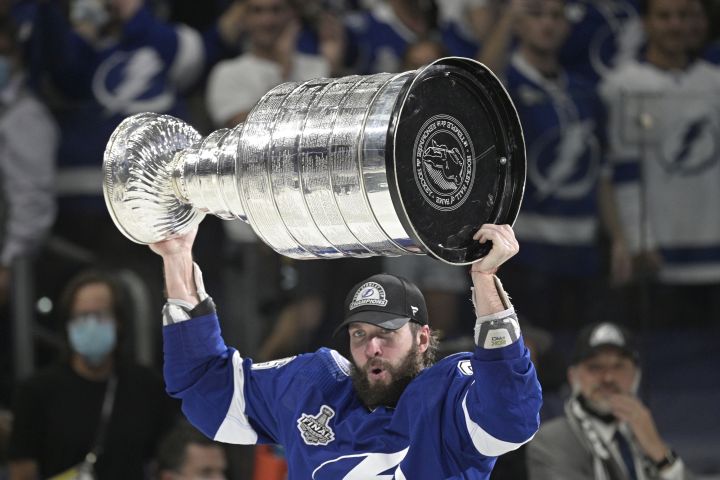Nikita Kucherov was happy to be the villain last summer.

After he and his Tampa Bay Lightning teammates hoisted the Stanley Cup for a second-straight season, the star winger sported a T-shirt with the slogan “$18M Over the Cap” in response to criticism the team had unfairly gamed the NHL system.
Tampa Bay was salary cap compliant during the regular season, but that threshold — $81.5 million at the time — doesn’t apply during the playoffs when rosters expand. Kucherov, who was on long-term injured reserve for the entire 56-game regular season, notched 32 points in 23 playoff contests.
READ MORE: Tampa Bay Lightning win 2nd Stanley Cup in 2 years, ending Canadiens’ inspiring run
“We had a great season,” Carolina defenceman Dougie Hamilton said after the Hurricanes were eliminated by Tampa Bay in the second round. “We lost to a team that’s $18 million over the cap.”
Stretching the salary cap into the playoffs was one of the subjects touched on Tuesday by the NHL’s 32 general managers at their annual meetings in Florida, but that’s as far as things went.

Get breaking National news
“A lot gets made of it,” Calgary Flames GM Brad Treliving said.
“Nobody thinks there’s been abuse of it to the extent that there’s something that needs to change. It was a healthy discussion.”
Treliving added that the Kucherov situation was the reason for momentum around the issue ahead of the first in-person GM meetings in two years.
“What doesn’t get talked about is Kucherov didn’t play all year,” he said. “The league will review it. If there’s a need or requirement for change, we’ll talk about.”
Commissioner Gary Bettman said the system has worked well since the league’s hard cap was introduced in 2005.
“There was nobody who believed in that room that it’s been abused,” he said.
“It’s been more perception. But nobody was sitting there saying, `This is a terrible abuse, we’ve got to fix it.”’
Deputy Commissioner Bill Daly outlined how the league approaches players on long-term injured reserve when their expected date of return falls around the start of the playoffs to ensure everything is above board.
“We deal with the clubs, we get their medical records, we employ an independent medical expert,” he said. “We’ve never had any issues that stemmed from that. It’s a thorough process.”

Any change to the current system would have to be collectively bargained with the NHL Players’ Association, something for which the league doesn’t appear to have an appetite.
“In some ideal world, maybe that would be a good change,” Bettman said of the cap counting in the postseason. “The roster situation is different in playoffs. It’s not anything that’s going to get addressed as a front-burner issue anytime soon.”
The league confirmed that its salary cap is still projected to rise $1 million next season.
READ MORE: NHL GMs preparing for new economic realities brought on by COVID-19
Bettman said the league believes revenues will be close to its $5 billion target for business in 2021-22 despite restrictions on attendance related to the COVID-19 pandemic for the seven Canadian teams.
GMs also were briefed on a return of the World Cup of Hockey in 2024, but plans remain preliminary. A return of the squad of North American young stars and Team Europe was not part of the early discussions.
Daly said how the NHL deals with players and no-trade lists will be addressed. The league’s central registry, which handles all trades, hasn’t had that information, even though it is incumbent on clubs to disclose contract details for players with no-trade protection.
“We’ve already had discussions with the players’ association,” Daly said. “I don’t anticipate it being a problem getting to what we need.”







Comments